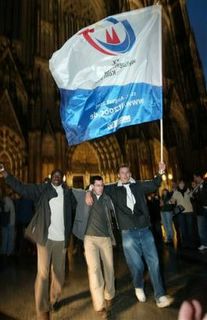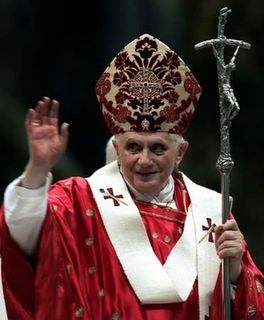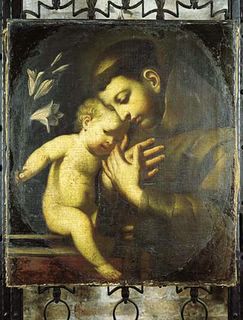 Youth in Cologne celebrating the election of Pope Benedict XVI, April 2005Imagine the three magi searching for the Infant King, guided by the star of Bethlehem. They travel from their far distant lands to find their King. This is the very first pilgrimage. It is not very different from any other pilgrimage. In our journey, we search for Christ the King and we are guided by Mary, Star of the Sea. The youth are also searching - they search for a reason, a purpose to live. They travel far and wide to search for their King and they are guided by a star, the Holy Father. When they find Jesus, their Master, they rejoice! Their hearts will never be the same again!
Youth in Cologne celebrating the election of Pope Benedict XVI, April 2005Imagine the three magi searching for the Infant King, guided by the star of Bethlehem. They travel from their far distant lands to find their King. This is the very first pilgrimage. It is not very different from any other pilgrimage. In our journey, we search for Christ the King and we are guided by Mary, Star of the Sea. The youth are also searching - they search for a reason, a purpose to live. They travel far and wide to search for their King and they are guided by a star, the Holy Father. When they find Jesus, their Master, they rejoice! Their hearts will never be the same again!
Prayer in Preparation of WYD 2005
Lord Jesus Christ, Saviour of the World,
You became man, to give us a life in abundance.
You promised to remain with us
in Your Church until the end of time.
Then Your Kingdom will come: a new heaven
and earth full of love, justice and peace.
This is our hope, our foundation. Thanks be to You.
Lord, we pray: Bless the young people around the world.
Reveal Yourself to those who are searching for You.
Awake those who do not believe in You.
Strengthen the faith of those who confess You.
Let them continuously set out to You
like the three Wise Men from the East.
Make them architects of a new civilisation of love
and witnesses of hope for the whole world.
Through them be close to those who suffer
from hunger, war and violence.
Inspire by Your Holy Spirit those who are contributing
the preparations of World Youth Day 2005.
Make them serve Your kingdom
with the power of their faith and their love
and let them welcome their brothers and sisters
from all over the world with open hearts.
Lord, You gave us Mary as our mother.
Let Her be our advocate for World Youth Day
so that it becomes a celebration of faith.
Bless Your Church with new strength these days,
so that She can become a credible witness for You.
We ask this through You, our Lord and God,
living in the unity with the Father and the Holy Spirit,
reigning forever and ever. Amen.
(Source: Official website of WYD 2005)
Calling all young people of the world! There is still time to participate in the 20th World Youth Day, August 15 - 21, 2005. Join the Holy Father in Cologne, Germany. You will not regret this experience of a lifetime. Find out from your parish if there is a contingent from your diocese going to Cologne in August. Check out the official WYD website here.
















